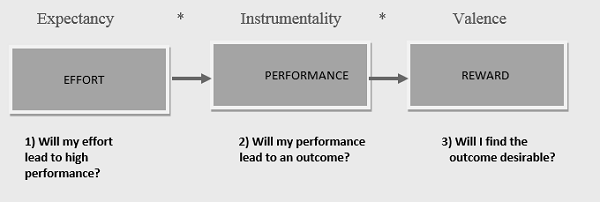Motivation plays an important role for employee job satisfaction and retention. Only motivated employees stay with the organization for long term. Employees feel secure through proper motivational techniques.
Employee retention system takes several steps to motivate employees.

Following are certain tips to follow to increase the motivation level of employees.
- Managers or supervisors should send appreciation mail to employees for good job done.
- There should be incentive, cash prize, or some perk for achievement to motivate employees.
- Performance appraisal on time is also an important factor of motivation.
- Role play or outdoor tours also create energy and freshness.
- Having a proper channel of communication of one-to-one interaction of HR department makes employees feel valuable.
- HR department must conduct motivation activity on work premises.
- Various incentive schemes for employees should be introduced.
Expectancy Theory in Talent Management
Expectancy Theory explains the process of how an individual processes different motivational elements. Expectancy theory is a motivation theory which was first proposed by Victor Vroom of the Yale School of Management.
Vroom’s Expectancy Theory assumes that behavior is a product of conscious choices among available alternatives whose intent is to maximize profits or pleasure, and minimize loss or pain.
Vroom believed that individual factors of an employee such as personality, skills, knowledge, experience, and mettles influence his/her performances. He stated that effort, performance and motivation are linked in a person's motivation. He uses the variables Expectancy, Instrumentality and Valence to account for this.

- Expectancy − The belief that increased effort leads to increased performance forms the basis of expectation. It is affected by many factors such as −
- Availability of resources and time required for the job
- Possessing such qualities and skills that are required for achieving the objective of the job
- Availing required managerial and technical support to carry out the job
- Instrumentality − It is an objective analysis of the job undertaken. It is based on the idea that if you perform extremely well, a valued outcome will be received. To be objective and particular about the outcome one needs to have a clear understanding of the relationship between one’s performance and its outcome. Employees should have trust in the people they work with. Transparency of the process determines the outcome.
- Valence − It refers to the emotional orientation which employees hold with respect to outcomes or rewards for the job done. The depth of the want of an employee for extrinsic (salary, promotion, free time, benefits) or intrinsic (satisfaction) rewards. Management must unearth what employees appreciate.
The three elements are important behind choosing one element over another because they are clearly defined: effort-performance expectancy (E>P expectancy) and performanceoutcome expectancy (P>O expectancy).
Object Oriented Theory in Talent Management
Different people with differing mindsets behave differently to different situations, be it in an organization or in the society. Many people are quite objective in their approach to any work. They work better, when they have some concrete facts in front of them i.e., what to do and what not to do. Upon this basis, the object oriented theory thrives.
Object-oriented approach requires rigorous process to do the right thing. It is a new way to think about organizational problems based on real work concept. The basic construct is an object, which combines both data structure and behavior.
What is object? It is the key to understand object oriented theory. Object can be anything such as employees in the organization, computer, machine, it is called as bundles of variable to and related method.
Message − It is one kind of media to pass the information between objects.

Object oriented theory shows that, there should be a proper communication channel between employees and top management so that they can share ideas, knowledge and their problem with the management.
Talent management is a never-ending process that requires continuous effort. It is not restricted to recruiting the right and qualified candidates at the right time and in the right job. It also involves exploring the hidden and extraordinary qualities of the employees and developing and nurturing them to get an expected outcome. Retaining the best talent in an organization is as big a concern as hiring and metamorphosing them into loyal and dedicated workforce.

Comments
Post a Comment